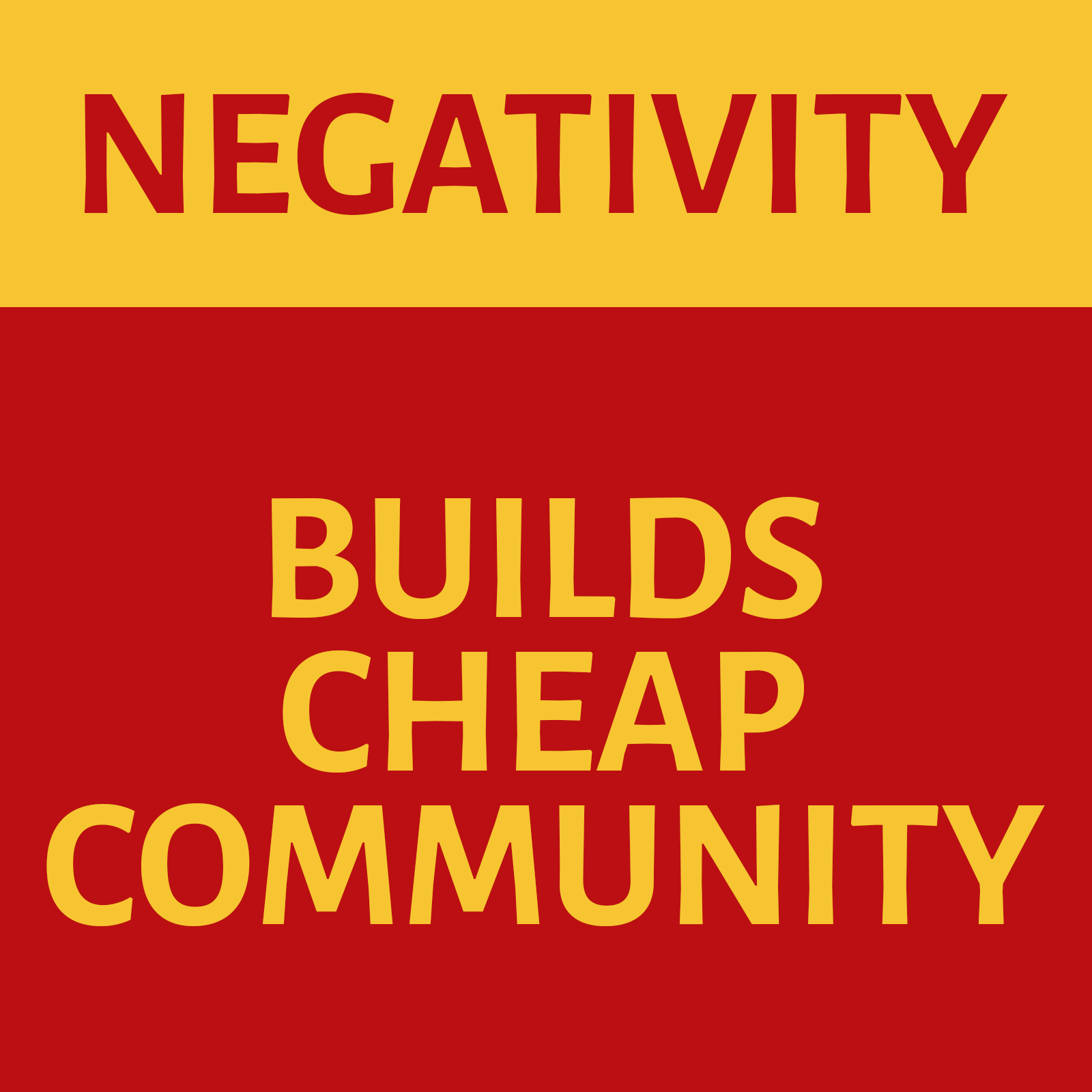
"Negativity is the quickest way to build cheap community," is what my friend Aaron Brown said while we were grabbing burgers in East London recently. I'm not sure I ever thought about it in that way, but the idea infiltrated my mind like the Russians infiltrated the United State's election process; subtly but forcibly. When I woke up the next morning the thought was still there, and stronger even. We had initially been chatting about the church and how easy it is to focus on all of the negative aspects of what 'church' means in the present tense. However, the implications of the statement reach far beyond the walls of a religious organization, or at least for me. I found myself massively convicted.
Democrats bash Republicans. Trump slams the media. Millenials condemn the Instagram algorithm. We all hate the new Star Wars film. You get the idea. As soon as anyone says they are against something it takes all of three seconds to amass a group of supporters and pop-up the newest franchise in the business of the fast-food community. Sure, it might feel fulfilling at the moment, but eventually it only provides a gross emptiness in the pit of the stomach. I can't tell you how many dinners I've been to with co-workers where the entirety of our conversation revolved around how terrible work is, only to think later, "What a waste of a conversation." It only takes one look at social media to see that people are rarely joined together by anything that isn't negative, and what is negative the masses swarm to. Many of the most 'positive' movements are often rooted in a pot of bitter soil, where the chants of its supporters evolve into what they are against rather than what they are for. The noblest of crusades are often dismantled through tactics of condemnation and slander. The mantra of "Join-up or jog-on" resounds everywhere. We've each built our own clubhouse and the passcode is "Be against what we're against, or you're not welcome here." This isn't just within politics or religion either. It's a pervasive virus existing in our thoughts, attitudes, and emotions. We find it thriving at the dinner table and breeding in small third-wave coffee shops.
To survive, negativity begs that more and more people join its cause. It is the Uncle Sam poster shouting, "I Want You," with its knobbly finger pointed directly at us, hoping to guilt enlistment. One doesn't need to look further than the internet for its call to arms. Just recently, in an article published on The CUT, the writer puts on display one individual's thankfulness and how it ought to be stomped on, leaving the reader with a call to action to stew in everything that's wrong with the world. You'd be pretty hard-pressed to find someone with no idea of the issues plaguing humanity right now, but just in case, here's another reminder.
— — — — —
Why is it easier to find commonality with others when it's surrounding something negative? Perhaps it's easier or quicker, or maybe it's because by taking a position that is for something, we fear others might see our perspective incorrectly and turn their firey arrows in our direction, and then we'll have no community. We're afraid of being isolated or ostracized or viewed as the leprotic man at the edge of the town who is regarded by nobody as anything other than a disease. By joinging in negative discourse, we at least allow others to believe we're on their side, even if we aren't, and that our life is as terrible as theirs and everyone else's. Misery loves company, as they say. That couldn't be more true of us in 2017. Being miserable is the norm and anything other than is seen as ignorance and indifference toward the issues at hand.
What does all of this matter though? How does this negativity toward negativity amount to anything other than my feeble attempt to have you join my cause? How can we combat this wide-spread epidemic? The quickest way to root out negativity and build genuine community is to develop patterns of thanksgiving and gratitude. It's undoubtedly true that there are endless amounts of troubling scenarios continually unfolding in this world, but complaining about them, exclaiming how terrible they are, and gathering others around them doesn't often change anything. However, by planting seeds of gratitude, we are able to comprehend what's wrong with our surroundings, but not dwell on things that are devoid of hope. There is always hope, and for those who claim to follow Christ, we should be leading from this perspective. Sadly, I'm guilty of falling into this pit of gloom, but here is another attempt to claw my way out and trust in the God who makes all things new, to redeem a world that's fallen into despair. None of this thinking is new or novel, and maybe this is just an overflow of my own conviction, but as someone who has worked hard to build genuine communities, I hope to develop them around ideas originating from what I'm for, rather than against. Those who have affected the most significant positive changes in this world haven't done it from a place of negativity but of passion, and hope for a better way, and I aim to follow suit.
December 2017